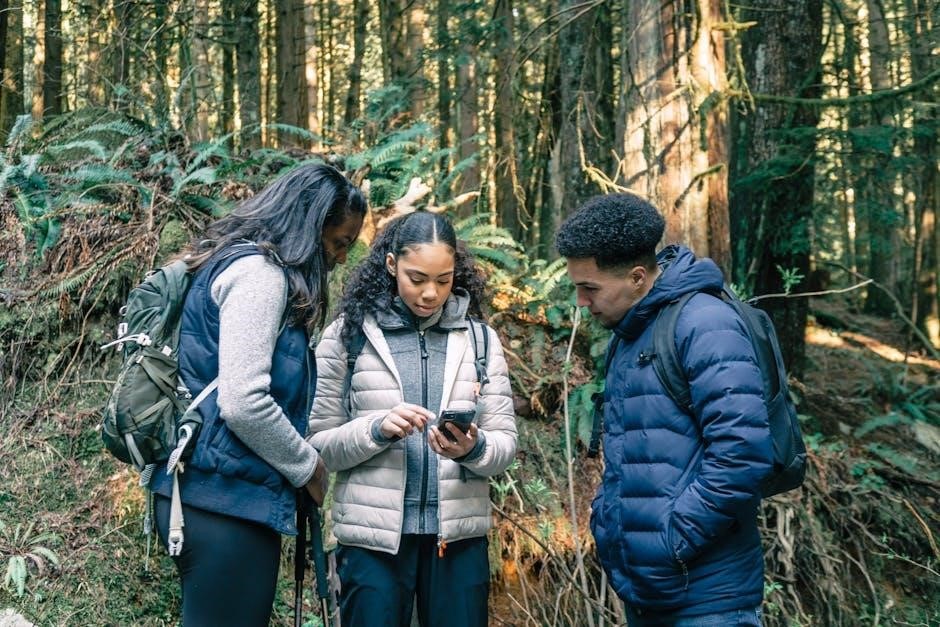The Coyote Mentoring Philosophy emphasizes fostering deep connections with nature through playful curiosity and holistic learning․ It inspires environmental stewardship and well-being by rekindling a sense of belonging to the natural world for all ages․
The Core Principles of Coyote Mentoring
The Coyote Mentoring Philosophy is rooted in fostering a deep, meaningful connection with nature through playful curiosity and holistic learning․ At its core, this approach emphasizes the importance of nurturing a sense of wonder, curiosity, and belonging in the natural world․ It encourages learners to embrace their innate connection to the environment, viewing nature as a teacher and a guide․ The philosophy is built on the idea that learning is most effective when it is experiential, engaging, and rooted in the present moment․
Key principles include the use of storytelling, tracking, and sensory awareness to deepen nature connection․ Mentors are encouraged to create “invisible learning” experiences, where lessons unfold naturally through exploration and discovery․ This approach also highlights the value of playfulness, allowing individuals to reconnect with their inner child and foster a sense of joy in learning․ By integrating these principles, Coyote Mentoring aims to cultivate environmental stewardship, personal growth, and a lifelong appreciation for the natural world․
- Emphasizes curiosity and wonder as foundational to learning․
- Encourages immersive, hands-on experiences with nature․
- Incorporates storytelling, tracking, and sensory exercises․
- Fosters a sense of belonging and connection to the environment․
- Supports holistic development of body, mind, and spirit․
These principles create a framework for mentors, educators, and parents to guide others in building a meaningful relationship with nature, one that inspires respect, awe, and responsibility for the world around us․
How Coyote Mentoring Fosters a Deep Connection with Nature
Coyote Mentoring fosters a deep connection with nature by encouraging individuals to engage with the natural world through curiosity, playfulness, and sensory awareness․ This approach emphasizes the importance of slowing down and immersing oneself in the environment, allowing for meaningful interactions with plants, animals, and landscapes․ By embracing a mindset of wonder and awe, participants are able to cultivate a sense of belonging and responsibility toward the Earth․
Key strategies include storytelling, tracking, and mapping, which help individuals develop a deeper understanding of nature’s rhythms and patterns․ These activities not only enhance environmental literacy but also nurture a spiritual connection to the land․ The philosophy encourages mentors to guide learners in ways that honor their unique experiences and foster a sense of kinship with the natural world․

- Encourages immersive, hands-on experiences with nature․
- Uses storytelling and sensory exercises to deepen connection․
- Teaches tracking and mapping to understand nature’s patterns․
- Fosters a sense of belonging and stewardship․

By integrating these practices, Coyote Mentoring creates a powerful framework for building lifelong relationships with nature, inspiring individuals to become active caretakers of the Earth․
The Role of Playfulness and Curiosity in Nature Connection
Playfulness and curiosity are central to the Coyote Mentoring approach, serving as powerful catalysts for nature connection․ These qualities inspire individuals to explore the natural world with enthusiasm and openness, fostering a sense of wonder and engagement․ By embracing play, learners of all ages can transcend traditional educational boundaries and connect with nature on a deeper level․
Curiosity drives individuals to ask questions, observe patterns, and seek answers, which are essential skills for environmental literacy․ Playfulness, on the other hand, creates a relaxed and enjoyable atmosphere, making learning feel organic and spontaneous․ Together, these elements encourage creativity, experimentation, and a sense of adventure, helping to break down barriers between humans and the natural world․
- Playfulness fosters creativity and exploration․
- Curiosity drives discovery and learning․
- Both elements create a joyful, engaging experience․
- They help build a lifelong connection with nature․
By integrating playfulness and curiosity, Coyote Mentoring empowers individuals to develop a meaningful and lasting relationship with the natural world, emphasizing that learning about nature should be a fun, dynamic, and transformative experience․

Practical Activities for Connecting with Nature
The Coyotes Guide offers practical activities like outdoor games, storytelling, tracking, and music to encourage nature exploration and learning․ These engaging methods foster a deep connection with the environment for all ages, making nature accessible and enjoyable in a fun and meaningful way․
Outdoor Games and Exercises to Spark Curiosity
The Coyote Guide emphasizes outdoor games and exercises designed to ignite curiosity and foster a deeper connection with nature․ Activities such as nature scavenger hunts, sensory exploration walks, and animal tracking encourage participants to engage actively with their surroundings․ These exercises are crafted to be both fun and educational, helping individuals of all ages develop observation skills and a sense of wonder․ Games like “Camouflage” or “Nature Hide-and-Seek” challenge participants to blend into the environment, while “Sound Mapping” invites them to listen and record the diverse noises of nature․ These interactive experiences not only promote physical activity but also cultivate mindfulness and appreciation for the natural world․ By sparking curiosity, these games lay the foundation for a lifelong journey of environmental exploration and stewardship․ They are tailored to be adaptable, ensuring that mentors, educators, and parents can lead them in ways that suit their group’s needs and the local ecosystem․ Through play, the Coyote Guide transforms nature into a dynamic classroom, where learning is joyful and immersive․
Storytelling as a Tool for Environmental Literacy
Storytelling is a cornerstone of the Coyote Guide, serving as a powerful tool to inspire environmental literacy and deepen connections with nature․ Through engaging narratives, mentors and educators can share stories that highlight the interconnectedness of ecosystems, the lives of animals, and the cycles of the natural world․ These stories often incorporate local folklore, ecological wisdom, and personal experiences, making learning relatable and memorable․ The Coyote Guide encourages the use of storytelling to spark curiosity and empathy, helping individuals develop a sense of responsibility toward the environment․ Activities such as “Nature Storytelling” invite participants to craft their own tales based on observations, fostering creativity and a deeper appreciation for the land․ By weaving stories into outdoor experiences, the Coyote approach creates a bridge between imagination and reality, inspiring stewardship and a lifelong connection to the natural world․ This method not only educates but also nurtures a sense of belonging and wonder, essential for fostering environmental awareness․
Tracking and Mapping: Essential Skills for Nature Exploration
Tracking and mapping are fundamental skills in the Coyote Guide, empowering individuals to explore and understand the natural world deeply․ These practices encourage observation, curiosity, and connection with the land․ By learning to identify animal tracks, scat, and other signs, participants gain insights into the behavior and habitats of wildlife․ Mapping these discoveries fosters spatial awareness and a deeper appreciation for the interconnectedness of ecosystems․ The Coyote Guide provides practical exercises and techniques to develop these skills, making them accessible to people of all ages․ Tracking and mapping not only enhance environmental literacy but also promote a sense of stewardship and wonder․ These activities encourage individuals to slow down, observe, and engage with nature in a meaningful way, fostering a lifelong connection to the outdoors․ By combining observation with creativity, tracking and mapping become tools for exploration, education, and inspiration, helping people to see the world with fresh eyes and a deeper sense of connection․
Songs and Music in Nature-Based Learning
Songs and music play a vital role in the Coyote Guide, serving as powerful tools for nature-based learning․ Through melodies and rhythms, these elements create a sense of connection and community, making the learning experience more engaging and memorable․ The Coyote Guide incorporates a variety of songs that reflect the natural world, helping participants develop an emotional and spiritual bond with the environment․ Music is used to teach about wildlife, ecosystems, and the interconnectedness of all living beings․ By singing together, individuals foster a collective sense of wonder and curiosity, which are key to deepening their relationship with nature․ Additionally, music enhances storytelling and cultural sharing, preserving traditional knowledge while inspiring new generations to care for the Earth․ The guide offers a wide range of musical activities, from simple chants to complex compositions, ensuring that everyone can participate and benefit from this joyful form of environmental education․ Through song, the Coyote Guide brings people closer to nature and to each other, creating a harmonious and lasting connection with the world around them․

The Importance of Environmental Literacy
Environmental literacy fosters a deep understanding of nature’s interconnectedness, promoting conservation and well-being․ It engages the body, mind, and spirit, inspiring stewardship and a lifelong connection to the Earth, essential for sustainable living․
Engaging the Body, Mind, and Spirit in Nature
The Coyote Guide emphasizes the importance of engaging the whole being—body, mind, and spirit—in nature connection․ This holistic approach fosters a deeper sense of environmental literacy and stewardship․ By involving the body through hands-on activities like tracking, mapping, and outdoor games, individuals develop a tangible relationship with the natural world․ The mind is nurtured through storytelling, curiosity-driven exploration, and reflective practices, encouraging a sense of wonder and critical thinking․ Simultaneously, the spirit is enriched by cultivating a sense of belonging and awe, which are essential for emotional and spiritual well-being․ This integrated method not only combats “nature-deficit disorder” but also inspires individuals to adopt a lifelong commitment to caring for and understanding the Earth․ By engaging all aspects of human experience, the Coyote approach creates a transformative and meaningful connection with nature, benefiting both individuals and the planet․
How Nature Connection Combats “Nature-Deficit Disorder”
Nature connection, as outlined in the Coyote Guide, is a powerful antidote to “nature-deficit disorder,” a term coined to describe the growing disconnection between humans and the natural world․ This disconnection has been linked to various issues, including decreased physical and mental health, reduced creativity, and a lack of environmental stewardship․ By fostering regular and meaningful interactions with nature, the Coyote approach helps to mitigate these effects․ Through activities such as tracking, storytelling, and outdoor games, individuals, especially children, are encouraged to explore and appreciate the natural world․ These experiences not only enhance physical health but also nurture emotional well-being and cognitive development․ The Coyote Guide emphasizes the importance of making nature connection accessible and enjoyable, ensuring that individuals of all ages can benefit from a deeper relationship with the Earth․ By addressing the root causes of nature-deficit disorder, the Coyote philosophy promotes a healthier, more balanced way of living that values and respects the natural environment․
Teaching Children (and Adults) to Appreciate the Natural World
Teaching children and adults to appreciate the natural world is at the heart of the Coyote Guide’s philosophy․ By integrating playful and engaging activities, this approach fosters a sense of wonder and curiosity about the environment․ The guide emphasizes the importance of hands-on experiences, such as outdoor games, storytelling, and tracking, which help individuals develop a deeper connection with nature․ These activities are designed to be accessible to all ages, making them ideal for mentors, educators, and parents seeking to inspire a love for the natural world․ The Coyote Guide also highlights the value of environmental literacy, encouraging individuals to understand their place within ecosystems and to develop a sense of responsibility for the Earth․ By creating opportunities for meaningful interactions with nature, the Coyote approach helps to cultivate a lifelong appreciation for the natural world, benefiting both personal well-being and the health of the planet․ This method not only educates but also empowers individuals to become stewards of the environment․